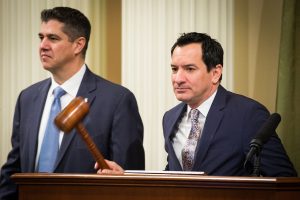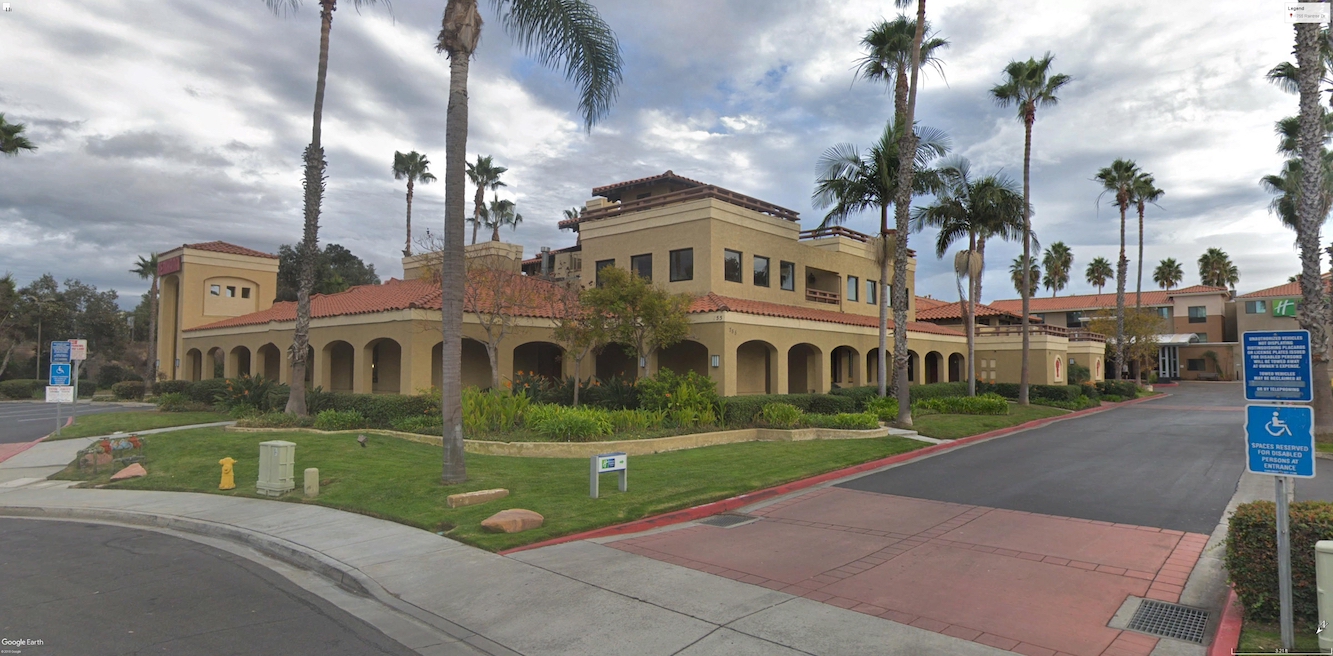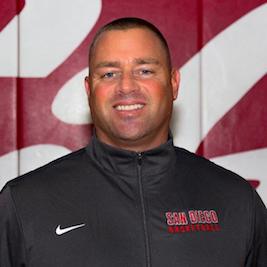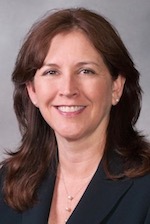Daily Business Report-March 9, 2018
Sen. Toni Atkins, shown here with Assemblyman Todd Gloria, also of San Diego, takes over as President pro Tem of the state Senate on March 21. (Photo by Max Whittaker for CALmatters)
Poised to Lead the State Senate on March 21,
San Diego’s Toni Atkins Vows to Cut Capitol Rivalries
By Laurel Rosenhall | CALmatters
Shortly after her election to the Assembly in 2010, Democrat Toni Atkins of San Diego came to Sacramento for a new lawmakers’ orientation. She’s never forgotten the adage imparted by a veteran lawmaker: “The Republicans are our opponents. But the Senate is our enemy.”
Those words reflect a reality that is entrenched for Capitol insiders, yet almost invisible to the outside world: The two houses of the Legislature are long-standing rivals.
Yes, the Senate and Assembly are both ruled by Democrats. And yes, the two chambers must cooperate to pass any new laws. But that hasn’t stopped a culture of one-upmanship for decades. The result can be substantive—feuding houses kill each other’s bills—or petty—the Assembly and Senate once broke for summer recess on different weeks because their leaders couldn’t even agree on the calendar.
Now Atkins is set to make history as the first person in more than 100 years to lead both houses of the Legislature—something only two other people have done, both during California’s early years of statehood. She was Assembly speaker from 2014 to 2016, and becomes Senate leader on March 21—also becoming the first woman and first openly gay person to lead the upper house.
While no one expects her tenure to erase the Legislature’s deep rivalries, Atkins is well positioned to tamp them down. She’s taking the Senate reins just as changes to term limits have begun to silo legislators in each house. Previously, many lawmakers moved between the Assembly and Senate as their terms expired. Now that they can seek re-election in the same house for up to 12 years, they’re more inclined to stay put.
“If anybody can bridge that gap, it’s her,” said Democratic political consultant Steve Maviglio, who saw the Legislature’s rivalries up close as an aide to former Assembly Speaker Fabian Núñez. “She understands the dynamics of the Assembly… She has years of cat-herding experience… But most importantly, she has a relationship with the Speaker.”

Most recent Senate and Assembly leaders emerged from separate spheres of power, with little prior rapport. But Atkins and current Speaker Anthony Rendon were Assembly colleagues for four years. They worked together closely to craft a $7.5 billion water bond in 2014, an effort that required navigating an array of geographic and political interests to create a bipartisan plan. Along the way, Rendon said he came to appreciate Atkins’ thoughtful style, as well as her love for southern literature and college basketball. When she ran for Senate in 2016, she passed the speakership to him. “We worked really well together,” Rendon said. “She was someone I leaned on, when I got to Sacramento, for advice and for help.”
The water bond was one of her key accomplishments as speaker during a tenure otherwise plagued by frequent rebellion within her ranks. Atkins couldn’t achieve her own priority in 2015: to fund affordable housing development via a new fee to some real estate transactions (she persisted as a senator and prevailed last year).
In the Assembly, “my focus had to become, ‘What are we trying to get done for the whole body?’ And so I couldn’t spend the time on my housing bill,” she said. “Now maybe I could’ve threatened people, but that’s not my way.”
Atkins also couldn’t persuade her caucus to support a high-profile climate change bill in 2015 backed by Gov. Jerry Brown and Senate leader Kevin de León. SB 350 sought to increase energy efficiency and the use of renewable sources to generate electricity, while slashing California’s oil consumption. Many Assembly Democrats balked at the oil provision.
Atkins had to tell de Leon that the votes weren’t there, igniting a major feud between the two houses. The Assembly passed the bill after the oil piece was removed—an industry win and a ding on de León’s environmental record. Months later, at a charity event where lawmakers publicly roast each other, de Leon lobbed a brutal comeback.
“Did you know that WSPA stands for Western States Petroleum Association?” he said. “And all this time I thought it meant We Specialize in Purchasing Assemblymembers.”
Since then, the progressive Senate has passed several bills that have stalled or been watered down in the more moderate Assembly, including legislation to create a single-payer health care system (which Atkins co-authored), get 100 percent of the state’s electricity from renewable sources, and limit how local law enforcers cooperate with immigration agents.
Rendon said his house grew frustrated with the Senate passing “purely symbolic” bills, and that the Assembly was being “more adult” by amending or putting the brakes on them.
More recently, the two houses struggled to get on the same page in responding to allegations of sexual harassment. After 150 women signed an open letter complaining of pervasive misconduct in the Capitol, the Senate and the Assembly launched separate hearings. Only after criticism from victims did they form a joint panel.
Some Senate-Assembly power struggles have become the stuff of Capitol legend. In the 1980s, Assembly Speaker Willie Brown billed himself as the “Speaker of the Legislature” on a party invitation, prompting an angry rebuke from Senate leader David Roberti.
In the early 2000s, jousting was common between Assembly Speaker Fabian Núñez and Senate leader Don Perata. Late one night in 2006, as both houses were working to approve bond measures, Perata tired of waiting for the Assembly to send its bills to the upper house. Suddenly he banged his gavel and ended the session, effectively killing the Assembly’s bills. Nunez was so furious he temporarily banned senators from setting foot on the Assembly floor.
“It shocked a lot of people I would do that,” Perata recalled, “but I’m only going to take so much game playing.”
The friction can worsen in a session’s final days and hours, as each house may delay transmitting bills to the other house as a way to leverage deals.
Will Atkins and Rendon avoid such brinkmanship?
“Hopefully the strength of our relationship and our communication will lessen a lot of that,” Rendon said.
“You get this culture passed on to you,” Atkins said. “But I’m not going to perpetuate this ‘us versus them.’ ”
CALmatters is a nonpartisan, nonprofit media venture explaining California policies and politics.
__________________
Paul Jacobs Leaves Executive
Chairman Post at Qualcomm

Qualcomm announced today that Dr. Paul E. Jacobs will no longer serve as executive chairman as the takeover battle with Broadcom enters its fifth month.
The announcement represents the end of an era for the San Diego-based wireless pioneer as it will be the first time since the company’s founding that a member of the Jacobs family has not served in a top executive role.
Jacobs is the son of Irwin Jacobs, who with Andrew Andrew Viterbi founded the company in 1985. The younger Jacobs, who was CEO from 2005 to 2014, will remain on the board, “but will no longer serve in an executive management capacity,” the company said.
“The board is committed to the principles of strong corporate governance and believes that having an independent director as chairman at this important juncture in Qualcomm’s history is in the best interest of the company and our stockholders,” the company said in a statement before financial markets opened on Friday.
Qualcomm shares were trading around $63, up nearly 2 percent, shortly after markets opened.
The board named Jeffrey W. Henderson, an independent Qualcomm director since 2016, to serve as non-executive chairman. Henderson was chief financial officer of Cardinal Health from 2005 to 2014 and previously held management positions at Eli Lilly and General Motors.
“We are unanimous in our view that Jeff is the ideal choice for this role based on his deep financial, operational, and international experience as well as his strong stockholder orientation. We are focused on maximizing stockholder value, and will consider all options to achieve that objective, as we seek to move Qualcomm forward by closing the acquisition of NXP, strengthening our licensing business, and capitalizing on the enormous 5G opportunity before us,” said Tom Horton, lead director.
Horton described Jacobs as “a technology visionary whose ideas and inventions have contributed significantly to the growth of both the company and the industry.”
“Paul has led the development of generations of semiconductors that have fueled smart phones and the worldwide wireless revolution of the past 30 years. His deep expertise, coupled with a focus on innovation, have made Qualcomm a leader in critical technologies and positioned us at the forefront of the industry,” Horton said.
Broadcom is offering $79 per share in a deal valued at over $100 billion to acquire the San Diego company. It’s also seeking to install a new board of directors who will back the takeover.
__________________

Three Latitude 33 Projects Approved
Latitude 33 Planning & Engineering announced the approvals of Merge 56, Pacific Village, and Pacific Highlands Ranch Village Commercial Phase II. The Village at Pacific Highlands Ranch (Courtesy of Latitude 33)
Latitude 33’s recent planning approvals include:
- Merge 56 – The project by Sea Breeze Properties LLC features over 500,000 square feet of commercial, office, and retail space; a mix of 242 multifamily residential units (market rate and affordable); single-family homes; and public improvements. The 42-acre project was unanimously approved by the city of San Diego Planning Commission on Feb. 22.
- Pacific Village – Pacific Village by Lennar Homes of California and Atlantic Pacific is an upcoming 600-unit residential development consisting of 99 single-family homes, 105 triplex homes, 120 townhomes, and 276 apartments, including 60 low-income affordable units. The 41-acre project was approved by the San Diego City Council on March 5.
- PHR Village Commercial Phase II – This 2-acre project by Coast Income includes two commercial buildings and a parking garage. This project was also approved by the San Diego City Council on March 5.
“Because we do both the planning and engineering in-house, we were able to ensure these properties were designed and developed to the best extent possible,” said Melissa Krause, associate principal at Latitude 33. “We also collaborated with stakeholders and decision makers to ensure we understood the needs of the community to put forth the right project for the region.”
__________________
Yishi Jin Named to Junior Seau Endowed
Faculty Chair in Traumatic Brain Injury

The inaugural chair holder of the Junior Seau Foundation Endowed Chair in Traumatic Brain Injury at UC San Diego is Yishi Jin, professor and chair of the Section of Neurobiology in the Division of Biological Sciences. Jin’s research focuses on molecular genetic mechanisms underlying the development of the nervous system, and regeneration of wounded nervous systems, with the goal of better understanding human neurological disorders and brain injury.
The chair was established by the Junior Seau Foundation in memory of Junior Seau, the NFL Football Hall of Famer and longtime San Diego Charger. Seau died in 2012 and was subsequently diagnosed with chronic traumatic encephalopathy (CTE), a neurodegenerative disease associated with repeated blows to the head. The chair provides a dedicated source of funds, in perpetuity, for the chair holder’s scholarly activities as well as support for faculty salaries and graduate fellowships.

Jin has consistently broken new ground in a variety of areas in neurobiology throughout her career. Her research has led to the discovery of evolutionarily conserved and novel molecular pathways that control nerve regeneration after injury. She has won several prestigious awards, including a Presidential Early Career Award for Scientists and Engineers and a Jacob Javits Neuroscience Investigator Award. For the past 16 years she was an investigator of the Howard Hughes Medical Institute, a distinction held by top biomedical scientists. Jin and her colleagues recently discovered a new genetic pathway that carries hope for victims of traumatic injuries spanning stroke to spinal cord damage.
__________________

RAF Pacifica Group Acquires
Carlsbad Retail and Office Property
RAF Pacifica Group, a San Diego-based owner, operator and developer, has acquired an 18,127-square foot, two-story retail and office property located in Carlsbad for $3.2 million. The seller was Herrick Enterprises. RAF Pacifica Group plans to hold the property as a long-term investment.
The two-parcel property totals 1.89-acres located at 755 Raintree Drive, Carlsbad. Benihana has been a tenant of the property since the early 2000’s.
Colliers International San Diego represented the buyer.
__________________
Cal State San Marcos Ranked 13th on
List of Safest College Campuses
California State University San Marcos is ranked 13th in the National Council for Home Safety and Security’s 2018 ranking of the Safest College Campuses in America. The council created the rankings using the most recent data from the FBI’s Uniform Crime Reporting and the Campus Safety Security Survey put out by the U.S. Department of Education.
CSUSM is the top-ranked university in California.
Nearly all accredited institutions with enrollment of at least 10,000 were considered for the rankings, except for those in which a significant amount of data was unavailable. Each school’s safety score was calculated by analyzing crimes reported by universities. Also factoring into the safety score were violent and property crime rates for the cities in which the schools are located, and the number of law enforcement officers employed by the institution per 1,000 students.
__________________
San Diego City College’s Mitch Charlens
Named Coach of the Year by PCAC

Mitch Charlens, head coach of men’s basketball at San Diego City College, has been named Coach of the Year for 2018 by the Pacific Coast Athletic Conference South Division. This is the seventh time that he received this honor.
Charlens has now led the City College Knights Men’s Basketball team to conference titles seven times (2005, 2009, 2012, 2014, 2016, 2017, and 2018), three appearances in the Elite Eight, and going for a second state title since joining the program in 2004/05 season. Charlens was also named California State Coach of the Year in 2009.
Charlens, a San Diego native, played basketball at University City High School in San Diego and then moved on to play at Saddleback College in Mission Viejo. He later played at San Francisco State University.
Charlens earned his bachelor’s degree in psychology at San Francisco State University and his master’s degree in physical education at Chico State University.
__________________
Personnel Announcements
Ramona R. Whitley Promoted at Allen Matkins

Allen Matkins, a real estate and business law firm, announced the promotion of Ramona R. Whitley to chief business development and marketin officer, working out of the firm’s San Diego office.
Ramona joined Allen Matkins in 2012 as director of client services and has been instrumental in advancing the firm’s customer service capabilities while identifying key business development opportunities. In this position she oversaw the firm-wide key client program competitive intelligence and strategic initiatives.
Prior to joining Allen Matkins, Ramona was director of marketing and business development at two separate leading law firms.



